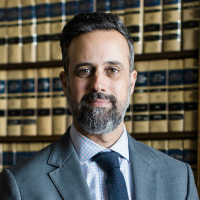San Pablo Felony Lawyer, California
Sponsored Law Firm
-
 x
x

Click For More Info:
-
The Nieves Law Firm
505 14th St. Ste. 900 Oakland, CA 94612» view mapCriminal Defense We Take The Criminal Out Of Criminal Defense
We are energetic, creative, and aggressive in our efforts to extricate you from your situation and help you get your life back on track.
800-681-5480
Seth Morris
✓ VERIFIEDCriminal, Felony, Personal Injury
When the legal system fails you, you can’t leave yourself or your child at the mercy of a judge and 12 jurors. Seth Morris has saved his clients fro... (more)
Jo-Anna Marie Nieves
✓ VERIFIEDCriminal, Felony, DUI-DWI, Misdemeanor, White Collar Crime
Armed with considerable experience working for the District Attorney in Sacramento, CA and her voluminous representation of large corporate clients in... (more)
Roxanne Monique Mosley
Misdemeanor, Felony, DUI-DWI, Criminal
Status: In Good Standing Licensed: 22 Years
Aaron Reuben Bortel
Criminal, DUI-DWI, Felony, Misdemeanor
Status: In Good Standing Licensed: 32 Years
FREE CONSULTATION
CONTACTFREE CONSULTATION
CONTACTFREE CONSULTATION
CONTACTFREE CONSULTATION
CONTACTRebecca Feigelson
Juvenile Law, Felony, DUI-DWI, Criminal
Status: In Good Standing Licensed: 12 Years
FREE CONSULTATION
CONTACT Jo-Anna Nieves Oakland, CA
Jo-Anna Nieves Oakland, CA AboutThe Nieves Law Firm
AboutThe Nieves Law Firm Practice AreasSpecializations
Practice AreasSpecializations



